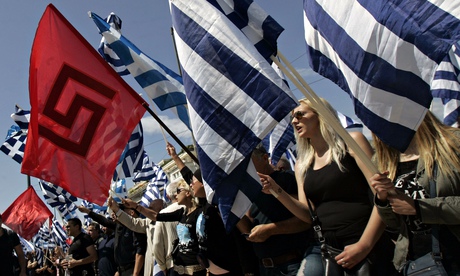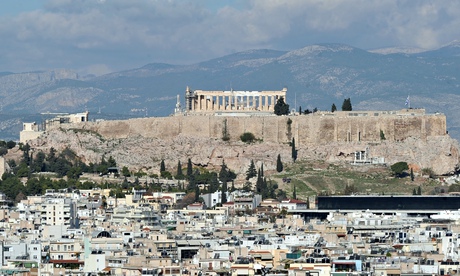By Holly Watt, Whitehall Editor 12 Jun 2014
Exclusive: Military deal which became symbolic of financial crisis now at centre of international legal case over Greece’s geo-political reputation

In total the submarine deal has cost at least three billion euros Photo: Greek Navy Press Office
Greece has launched a multi-billion euro claim against one of Germany’s biggest defence firms who sold the financially-beleaguered country four submarines in a complicated deal which has become symbolic of the country’s economic woes.
The controversial deal has threatened Greece’s position in NATO, according to well-placed sources, led to the criminal prosecution of the country’s defence minister and the resignation of a senior Naval figure.
The Telegraph today publishes photographs of the four submarines, which are still unfinished in a Greek shipyard almost 15 years after they were first ordered.
It can now be disclosed that the Greek Government has launched a seven-billion euro compensation claim against ThyssenKrupp Marine Systems and Abu Dhabi Mar – the defence firm and shipyard now responsible for the order.
A 200-page document sent to the ICC International Court of Arbitration states that Greece’s international position was compromised by the failure to supply the submarines and its position in NATO was undermined.
“The issue is so sensitive that we could claim even higher economic compensation from the Arabs and the Germans because the submarines are connected with the geostrategic role of the country, its place within NATO, and the fact that the country is awaiting the finalisation of the Exclusive Economic Zone which has brought several investors who want to invest in its natural resources,” said a well-placed source.
Following years of delay, the Greek Government has recently insisted that the submarines are finally due to start full sea trials imminently, although no date has been set. When one of the Greek submarines first went to sea, it was found to list heavily in certain sea conditions.
Greece’s spending on defence systems before the economic meltdown has attracted controversy, with the four submarines coming to symbolise the waste. The country was Europe’s largest importer of weapons, spending four per cent of GDP on armaments. It had 1,300 tanks – more than twice as many as Britain.
Greek politicians claimed that Germany encouraged Greece to spend vast sums on weaponry and then criticised the country for profligacy. However, a 3 billion euro deal to buy the four submarines – vessels the country does not even need – have become a tipping point and the new Greek administration now appears determined to seek compensation.
The ICC appeal is likely to be part of Greece’s attempts to shift the blame for its massive overspending onto other European countries. The International Court of Arbitration resolves international commercial disputes.
“If there is one country that has benefited from the huge amounts Greece spends on defence it is Germany," said Dimitris Papadimoulis, an MP with the Coalition of the Radical Left party, said previously.
Last year, the former defence minister Akis Tsochadzopoulos was jailed after being found guilty of receiving an €8m bribe from Ferrostaal, one of the German companies involved in the deal. Ferrostaal agreed to pay a €140m fine.
Stelios Fenekos, a 52-year-old vice admiral of the 22,000-man strong Greek Navy, also resigned his position in the wake of a row over the vessels. He said he did so in protest at the Greek defence minister’s decision to purchase the submarines, as well as other decisions taken that Mr Fenekos considers “politically motivated”.
"How can you say to people we are buying more subs at the same time we want you to cut your salaries and pensions?" said Admiral Fenekos.
The four Class 214 submarines have been mothballed in the Skaramangas shipyard near Athens in Greece for over two years, having been ordered over 15 years ago.
Workers left the shipyard in April 2012, but were recently told they would be rehired on wages 35 per cent lower than their previous salaries.
In total the submarine deal has cost at least three billion euros – three times more than the EU demanded that the Greek administration save from the country’s budget by cutting workers’ pensions, a move that sparked violent unrest in Athens.
Although the economy of the country is now slowing improving, Greece has received international financial bailouts which total 215 billion euros. In return for the bailout, Greek was ordered to adopt extreme austerity measures.
The four boats that are currently in Skaramangas were finally handed over to the Greek navy in March, although the deal was first signed in 2000. At that time, the Greeks ordered three Class 214 submarines with an option on a fourth.
ThyssenKrupp Marine bought the shipyard, which was responsible for building the submarines in 2002 and subsequently sold on a large shareholding to Abu Dhabi Mar.
The Navy is expected to carry out minor modifications on them and undertake sea trials in Souda Bay, Crete, before commissioning them into service.
The submarines are almost 214 feet long and carry 5 officers and 22 crew.
ThyssenKrupp Marine declined to comment as the company said it had not seen details of the claim.
Greece sues for 7 billion euros over German submarines that have never sailed - Telegraph
![The [Greek] European Tragedy](https://blogger.googleusercontent.com/img/b/R29vZ2xl/AVvXsEiWKI5s90SFm1wWTk6bs4p7CgslaC2SnYPsrZhb-B-smOufNNCSxCvpBLI9hOB-LsXZjir_PNmEiMk2-E62F3xkg96IoC6QFAaZAnPRTVH340IN9WBRmWJqPkjWlgyRj3zpALp7h6hvA58/s920/GkBack_new.jpg)




